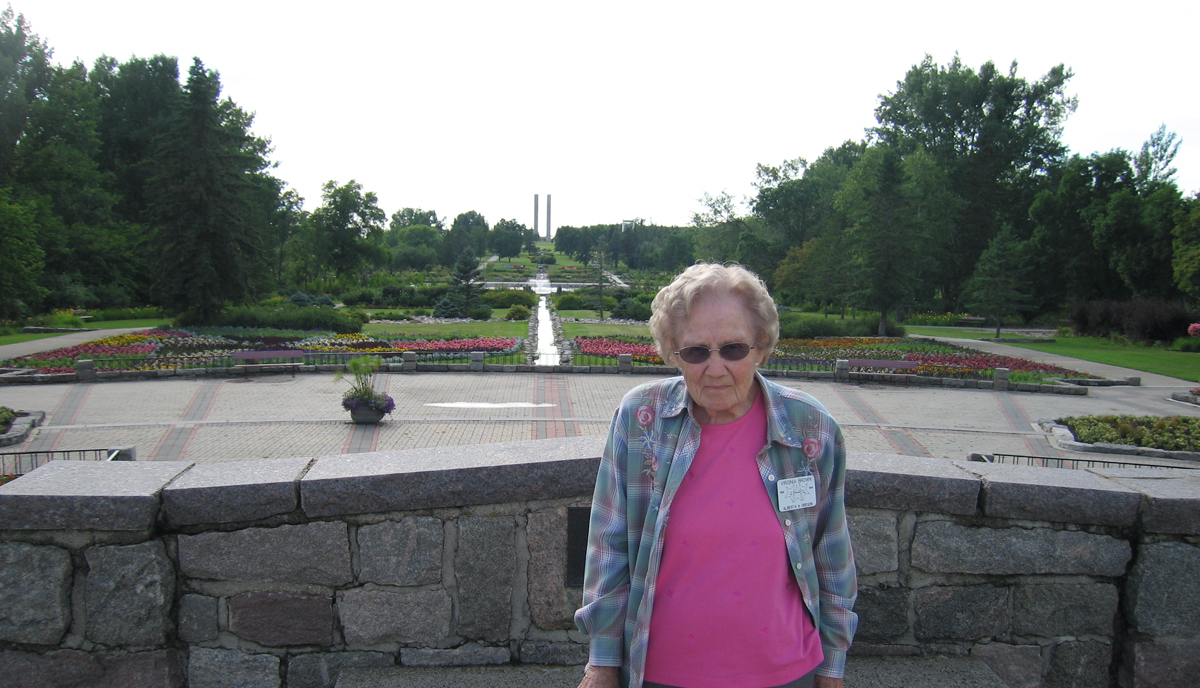I remember when I first began investing in real estate. As I discussed my first real estate purchase with various people, those in the older generation kept telling me they were too old to begin investing in real estate. They would say things like, “If only I was in my twenties, then I would consider it,” or “real estate is a young man’s game,” or “I don’t want to be tied down anymore,” or “I’m retiring in a couple of years, so it’s too late for me to begin investing in real estate.”
All of these statements are based on incorrect assumptions about becoming a real estate investor. Even though I didn’t know it when I started investing, I can now see the error in this way of thinking. If you are not too old to invest in a mutual fund, or a certificate of deposit, then you are not too old to invest in real estate.
The picture with this article is my grandmother, Virginia Brown, on our motorhome trip to the International Peace Gardens in North Dakota. She was my inspiration to get into real estate investing. She made her last real estate transaction at age 85, about the time the picture was taken. She didn’t think she was too old to be investing in real estate.
Following are myths and mistaken assumptions that keep people out of the real estate investing business which is costing them and their heirs a lot of money.
Myth: Real estate investments require a long time to mature.
This is the number one misconception keeping older people from investing in real estate. They mistakenly think it takes a long time to make a profit and they feel they don’t have enough time left in their life to take advantage of real estate.
I invest in real estate for the cash flow. If you make sure the real estate properties that you purchase generate a positive cash flow, which puts money into your pocket, you start making money immediately!
Since when are immediate returns too long to wait for an investment? How can you be too old to collect immediate returns?
If you buy a certificate of deposit, it might take a year or more before you see any return on your money. When you buy a cash flowing property, you make money the next time you collect rent. If you buy on the last day of the month, you make a nice profit by the end of the next week. No other investment puts money into your pocket so quickly.
With our first purchase, we had $22,000 in cash flow the first full tax year of ownership. It has kept growing from there.
Real estate does not take a long time to start earning money. Cash starts flowing in immediately and those earning grow every year. Twelve years after our initial real estate purchase, our cash flow was enough to cover our entire retirement budget. If I had been 65 years old when I purchased it, I would have had my retirement income supplemented by $22,000 that first full tax year. By age 77 the cash flow would have grown enough to completely cover my retirement needs. No one is too old for more income.
If you are interested in hearing more about my real estate purchases and the income it produced, I spell it all out in my book The Doctors Guide to Real Estate Investing for Busy Professionals.
Myth: Buying a rental property would tie me down when I’m ready to travel.
This myth comes from the mistaken thought that if you buy a piece of real estate, you must do everything it takes to manage it yourself.
If you work in an office, I bet you don’t do everything it takes to run the office. If you are a physician, I bet you don’t answer the phone, put patients in the room or talk to the insurance companies. So why do you think you have to take care of all these issues if you buy a rental property? That is what property management companies do for a living, not you.
Before COVID my wife and I traveled extensively. In fact, when we added up all the adventures, we went on in 2019, it turns out that we had traveled more than 50% of the year. That doesn’t include day trips and the times we traveled to visit family.
So, if we can spend more than half of our time traveling, while the cash flow from our 55 rental units pay for it, then real estate investing will not tie you down in your retirement years either.
Myth: Real estate investing would tie up my money so I can’t get to it.
I read this all the time. It often sounds something like this: “I’m considering taking a cash out equity loan on my rental property to free up some money to invest. I’m tired of my money being tied up in real estate.”
But their money is not “tied up in real estate.” It is invested and producing a monthly income. Taking money out of one investment to move to another investment is not “untying” your money. It is still “tied up” in an investment. But now the real estate investment is producing less cash flow because of the additional loan payment that was added when the equity loan was acquired.
When you purchase real estate, you can invest a small amount of money to control a huge asset, this is called leveraging. If you invest $300,000 to own a $1,000,000 apartment building, your $300,000 produces income from a $1,000,000 investment. To make a $1,000,000 investment in a mutual fund would require $1,000,000 in cash.
If a real estate property is purchased with leverage, it will tie up a whole lot less money for the same investment in any other source. And yes, you can get money out of real estate by either cashing out equity with a loan, or by selling the property. The same way you can get your money with any other investment you make. You must give up the investment if you want to spend the cash. If you give up the investment, you lose your future income, no matter what the investment. This concept is not somehow different with real estate.
My favorite reason for investing in real estate is the freedom it produces at any age.
Real estate is the most freeing of all the investments. It has the fewest restrictions of any other retirement investment.
-No age restrictions: You can buy whatever you want, whether you are 99 years old or sixteen.
-There are no income restrictions: You can buy real estate whether your job pays a lot or a little.
-No Required Minimum Distributions.
-No investment limits: You can invest as much as you want, whenever you want.
-No need to sell an investment to produce cash flow: If you are invested in the stock market, in order to harvest money you must pick something to sell. I hate that. I don’t like deciding which mutual fund to sell for this year’s distribution. I don’t want to sell anything. Real estate gives you cash flow to spend without selling anything.
-No need for the 4% rule: With non-real estate investments you worry about running out of money if you sell too much principal too soon. Should you sell 4%, or can you take 5%, or must you hold back and only live on 3% of your investments. With real estate you can spend all your cash flow without worry. Next year the cash flow is likely to be higher as rents raise.
-Free from excessive taxes: Because real estate produces depreciation, much of the real estate cash flow is tax free. You can spend it all and not worry about holding back money for taxes. For about the first decade of our real estate investing, all the cash flow was tax free. Then our real estate income started to exceed our annual depreciation. Today about half of the cash flow is tax free and the remainder is taxed. If I really hated paying the taxes, I could do a 1031 exchange into a bigger property which would increase my depreciation to cover all my rental income. But I’m too busy traveling to worry about taxes. I just go ahead and spend the income and enjoy my reduced taxes.
I hope you see now that you are never too old to make an investment that will put money into your pocket from day one. We can use more money at every age.
If you are one of those who refuse to let a property management company take care of your investment and you insist on managing it yourself, then get my course The Doctors Course to Automating Your Real Estate Investing so you can manage your property in less time. Up until I retired, I managed all of my 64 rental units as a full-time surgeon. It only took me about 10-15 hours a month. There is no reason to let the management become a burden.






JUST what I needed to hear. Thank you Baby Boomers
I love the article. I’ve been doing real estate since the 1980’s. This year, at 73, I sold a property for $21,000 more than list price, sold a building lot and bought another rental unit. Never boring.
Great article. I am 55 years old with 54 rental units, that I began buying at 44 years old. I’ve been retired nearly 5 years now, strictly on cash flow from rentals as my traditional retirement investments continue to grow. You’re never to young or too old to invest in real estate. I’m always looking for my next property. Keep up the good work Doc!
ThomH Thanks for the comment. Congratulations on reaching retirement on real estate cash flow. I quit looking for property in 2007 when I realized I had enough and we didn’t need anymore for a very comfortable retirement. I learned the value of ENOUGH.
Real estate is all about location. You can buy a place and it can appreciate 50% or more in a few years if the location is correct.
Dividend Power thanks for adding to the discussion. Yes some places grow faster than others. That will be a matter of luck as it is hard to predict the future. I like going for the cash flow and then the appreciation is just a bonus.
I helped my mom and dad get their first rental condo at ages 72 and 75 respectively. You class and books are great. Thanks for all you do.
Charlotte, you are welcome. Glad to have helped you.
Thanks for this article. I read your book – Real Estate Investing for Busy Professionals, carefully selected a house that would cash flow, closed on it last week, worked on updates with my husband for several days and am now showing it for rental amounts a lot higher than I’d imagined. I learned a lot and continue to learn each day. I’m 51 and felt maybe I was too old, but 50s are the new 40s 🙂 Your words have been educational and encouraging – thank you!
Liz, you are welcome and congratulations for making your first purchase of investment real estate. You are not too old.